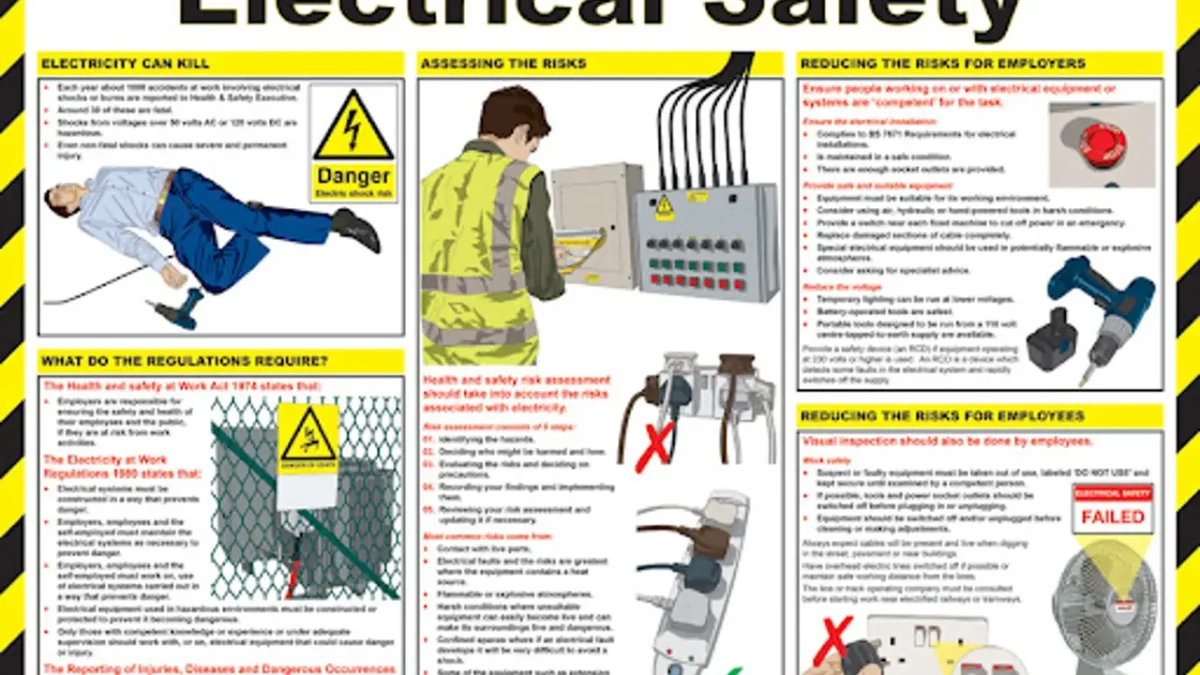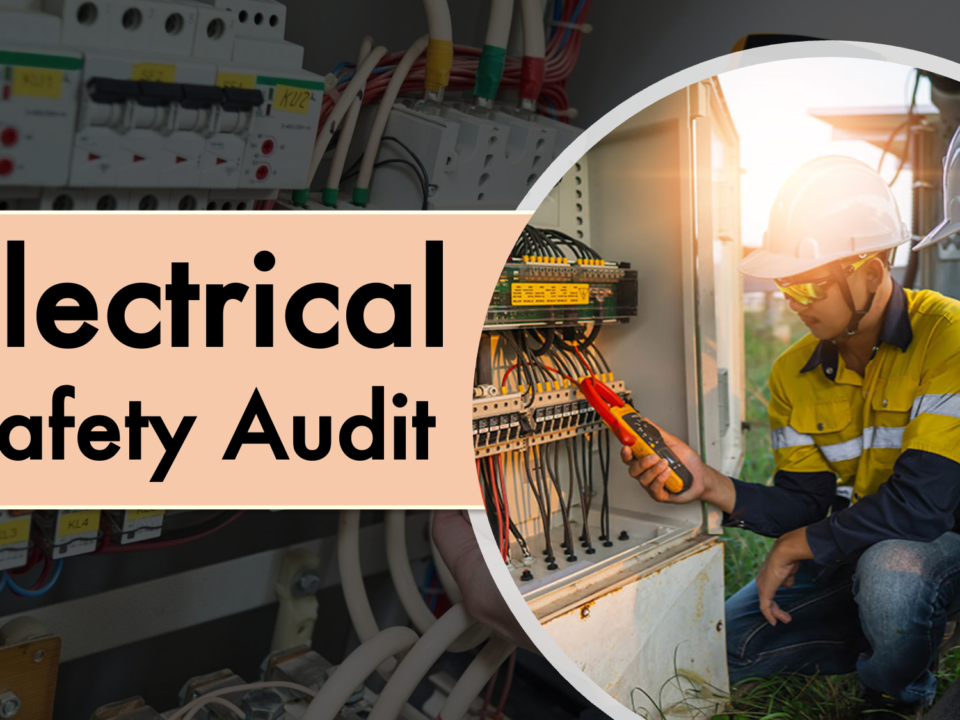Top 10 Essential Electrical Safety Rules and Tips for the Workplace

Integrating Fire & Life Safety Audits into Your Building’s Safety Management Plan
February 22, 2025
Why Behaviour-Based Safety Implementation is a Game – Changer for Ensuring Employee Well-being and Productivity
February 25, 2025Introduction: The Importance of Electrical Safety Rules in the Workplace
Ensuring compliance with electrical safety rules in the workplace is not just about adhering to regulations; it’s about safeguarding lives. Every year, thousands of accidents occur due to negligence or failure to follow basic electrical safety measures. From preventing fires to avoiding electrical shocks, electrical safety precautions are vital for maintaining a secure environment.
A well-structured safety program, incorporating 10 electrical safety rules, helps reduce risks significantly. Whether it’s the simple task of unplugging equipment or following complex procedures for high-voltage systems, adhering to these rules is crucial for everyone involved.
Electrical safety in the workplace ensures that employees are protected from hazards like short circuits, exposed wiring, and faulty equipment. By implementing the right precautions of electricity, employers can minimize workplace accidents and avoid costly downtime due to injuries or damaged equipment.
In addition to established protocols, understanding electrical safety points such as the importance of routine inspections, proper equipment maintenance, and employee training can save lives. Following expert electrical safety tips and installing warning signs also plays a key role in creating a hazard-free workspace.
In summary, investing in the enforcement of electrical safety rules is essential for any organization aiming to protect both its workers and its assets.
Electrical Safety Rules: Understanding the Basics
Understanding electrical safety rules is essential for maintaining a safe working environment. These rules are designed to protect individuals from potential hazards, such as electrical shocks, fires, and equipment malfunctions. Implementing basic electrical safety measures helps to reduce these risks and create a safer workplace for everyone involved.
The core principle of electrical safety revolves around minimizing contact with electrical sources and ensuring that all electrical systems are properly maintained. Simple actions, like turning off devices before servicing or keeping water away from electrical equipment, are vital electrical safety points that can prevent serious accidents. These actions form the foundation of the 10 electrical safety rules that every business should follow.
Incorporating electrical safety in the workplace goes beyond just following rules—it requires constant vigilance, employee training, and regular equipment checks. Businesses must prioritize electrical safety precautions, such as using proper signage, maintaining clear access to electrical panels, and conducting routine inspections.
Understanding the precautions of electricity will help employees recognize hazards and act quickly to mitigate them. Following expert-recommended Electrical Safety Tips can make a significant difference in the overall safety culture of a workplace, ensuring that all individuals remain protected from harm. By embracing these basic electrical safety rules, companies can build a solid foundation for long-term safety and compliance.
Top 10 Electrical Safety Rules You Must Implement at Work
Keep Electrical Equipment Away from Water
One of the most critical electrical safety rules is keeping electrical equipment far from water sources. Water is a powerful conductor of electricity, making any interaction between the two highly dangerous. When water comes into contact with electrical devices, it increases the risk of electrical shocks, short circuits, and even fires. Proper electrical safety measures must include checking that workspaces are dry and that electrical outlets are installed away from sinks or water sources. Additionally, one of the fundamental electrical safety precautions is ensuring that wet hands are kept away from switches and outlets. For workplaces, keeping electrical safety in the workplace a priority means enforcing strict guidelines about handling electrical devices near water. When coupled with routine inspections, following these electrical safety points minimizes the risk of accidents. Adhering to Electrical Safety Tips like using waterproof covers for outdoor equipment is a simple yet effective way to prevent potential hazards.
Unplug Equipment Safely
Properly unplugging equipment is one of the basic yet essential electrical safety rules that should not be overlooked. Many accidents occur when equipment is unplugged incorrectly, causing damage to cords or creating shock hazards. One of the key electrical safety measures is teaching employees or family members to unplug equipment by holding the plug, not pulling the cord. This prevents wear and tear on electrical wires, which could lead to exposed wiring or short circuits. Implementing such simple electrical safety precautions can drastically reduce the risk of electrical fires. It’s crucial for maintaining electrical safety in the workplace that employees are trained to disconnect devices during power outages or storms. Routine reminders about these electrical safety points can ensure that everyone knows the importance of unplugging devices when not in use. Following these Electrical Safety Tips will not only extend the lifespan of your equipment but also keep users safe from unnecessary risks.
Install and Organize Electrical Cords Properly
Disorganized cords present a serious tripping hazard and pose risks of damage that can lead to electrical shock or fire. One of the overlooked electrical safety rules is ensuring cords are properly installed and kept tidy. Cluttered or tangled cords can easily be damaged or wear out over time, exposing live wires. As part of your electrical safety measures, it’s essential to secure cords with clips or fasteners, keeping them off the floor and away from high-traffic areas. Additionally, a major part of electrical safety precautions is avoiding running cords under carpets or through doorways, as this can cause overheating or insulation wear. In ensuring electrical safety in the workplace, clear pathways and well-organized cords should always be maintained to prevent accidents. By following these electrical safety points, workplaces can avoid unnecessary risks. Always use these Electrical Safety Tips to minimize hazards while maintaining a clutter-free workspace.
Familiarize Yourself with Your Switchboard
One of the most important electrical safety rules is knowing where your switchboard is and how to operate it in an emergency. Familiarizing yourself with your switchboard is key to implementing effective electrical safety measures. In case of an electrical hazard, like a short circuit or fire, shutting off the power immediately could prevent further damage or injury. Every workplace and household should make it a priority to understand their electrical system’s layout. This step is one of the foundational electrical safety precautions that can reduce response time during emergencies. To maintain electrical safety in the workplace, employees should know which switches control which areas and understand how to safely reset breakers. Conduct regular inspections and training sessions on these electrical safety points to ensure everyone is prepared for potential issues. Including this task in your routine Electrical Safety Tips will create a safer, more efficient work environment.
Stay Alert to Overhead Electrical Lines
Awareness of overhead power lines is one of the most vital electrical safety rules for outdoor work environments. Contact with these lines can lead to fatal electrocution, making it critical to take extra electrical safety measures in such areas. Always ensure a safe distance from power lines when working with ladders, scaffolding, or any equipment that could accidentally come into contact with them. Adhering to strict electrical safety precautions like using non-conductive tools and maintaining awareness of your surroundings can prevent accidents. Companies must prioritize electrical safety in the workplace by marking high-risk areas and providing proper training. These electrical safety points should be communicated clearly to all workers, particularly those in construction or outdoor industries. By following these Electrical Safety Tips, workers can significantly reduce their exposure to potentially life-threatening hazards involving overhead lines.
Childproof Electrical Outlets
One of the critical electrical safety rules for homes, schools, and childcare facilities is childproofing electrical outlets. Children are naturally curious and may attempt to insert objects into outlets, leading to dangerous electrical shocks. One of the primary electrical safety measures to protect young children is installing outlet covers or tamper-resistant outlets. These simple yet effective electrical safety precautions ensure that little hands are kept away from live electrical components. If you’re considering electrical safety in the workplace, particularly in environments where children may be present, childproofing is a must. Installing plastic covers, and educating staff on monitoring outlets are important electrical safety points to keep in mind. In line with common Electrical Safety Tips, always ensure your outlets are properly maintained and that no loose wiring is accessible to curious children.
Investigate Flickering Lights
Flickering lights are often a sign of underlying electrical issues and should never be ignored. As part of your electrical safety rules, it’s important to investigate any flickering or dimming of lights as soon as it happens. Faulty wiring, overloaded circuits, or failing bulbs can all contribute to flickering, which poses a potential fire hazard. Implementing electrical safety measures such as checking connections and replacing damaged wiring can prevent bigger issues down the line. Regular inspection and maintenance should be part of your electrical safety precautions to ensure that no minor issue goes unnoticed. For electrical safety in the workplace, employees should report flickering lights immediately to the appropriate personnel for investigation. These electrical safety points highlight the need to act quickly on any electrical anomalies. Following these Electrical Safety Tips ensures that your lighting systems remain safe and functional.
Use Warning Signs Where Needed
Posting clear and visible warning signs around electrical hazards is one of the simplest and most effective electrical safety rules. Warning signs serve as a constant reminder to employees and visitors about potential dangers, such as high-voltage areas or wet conditions near electrical outlets. Establishing proper electrical safety measures by placing these signs in high-risk zones can prevent accidents. Signs are especially important in maintaining electrical safety in the workplace, where various personnel may be unfamiliar with specific electrical systems or hazards. Including visible warning signs is a crucial part of electrical safety precautions for any work environment. Ensure that these electrical safety points are incorporated into your safety training and inspections. Following these Electrical Safety Tips will reinforce awareness and create a safer, more informed work environment.
Avoid DIY Electrical Work
One of the cardinal electrical safety rules is to avoid attempting any DIY electrical repairs or installations. Electrical work should always be left to qualified professionals to prevent accidents, injuries, or damage. While it may be tempting to fix a minor electrical issue, improper handling can lead to severe consequences. Implementing electrical safety measures such as ensuring only licensed electricians handle repairs is crucial for workplace safety. This is one of the most important electrical safety precautions to follow, as DIY repairs can void warranties, violate regulations, and increase the risk of fire. For maintaining electrical safety in the workplace, always ensure that workers know the proper procedures for reporting electrical issues and contacting professionals. These electrical safety points highlight the importance of adhering to professional standards. Following these Electrical Safety Tips will help you avoid costly and dangerous mistakes.
Call for Professional Help When Needed
When it comes to electrical systems, knowing when to call for professional help is one of the key electrical safety rules. Many electrical problems, such as recurring outages, tripped breakers, or exposed wiring, require expert intervention. As part of your electrical safety measures, always have the contact information of a licensed electrician readily available for emergencies. Timely professional assistance can resolve issues before they become more dangerous or costly. This is a crucial part of electrical safety in the workplace, where complex systems may require specialized knowledge. Adhering to such electrical safety precautions ensures that repairs and installations are done safely and in compliance with local regulations. By following these electrical safety points, you’ll minimize the risk of accidents and ensure a safer environment. These Electrical Safety Tips reinforce the importance of seeking expert help when dealing with any significant electrical issue.
Conclusion: Reinforcing the Importance of Electrical Safety Rules in the Workplace
Adhering to electrical safety rules in the workplace is crucial for maintaining a hazard-free environment and protecting both employees and equipment. These rules help reduce the risk of injuries and ensure compliance with safety standards. Implementing comprehensive electrical safety measures minimizes the chances of electrical hazards, such as shocks, fires, or equipment malfunctions.
A strong safety culture starts with regular training, clear communication, and consistent application of electrical safety precautions. By integrating 10 electrical safety rules into daily routines—like routine maintenance and using protective gear—businesses can significantly reduce electrical risks.
Incorporating electrical safety in the workplace isn’t just about compliance; it’s an investment in employee well-being. Training staff on basic precautions of electricity, such as keeping water away from electrical equipment and reporting faulty wiring, helps prevent accidents. Simple Electrical Safety Tips like unplugging devices when not in use and maintaining organized workspaces offer long-term safety benefits for any organization.
Enhancing Safety Compliance with Process Safety Management and Fire Audits
For industries focused on safety compliance, such as those involved in Process Safety Management, it’s vital to hire a Process safety consultant and provide Process Safety Management Training to ensure overall safety culture. A Fire Audit can also complement these efforts, adding another layer of protection to the organization.
In conclusion, consistently enforcing electrical safety rules helps protect workers, prevents costly downtime, and demonstrates a commitment to safety excellence.
FAQs
What Are the 5 Golden Rules of Electrical Safety?
The 5 golden electrical safety rules serve as fundamental guidelines for any electrical work. They are:
Disconnect completely before starting any work.
Ensure that the power is off by testing.
Ground and short-circuit electrical devices.
Protect against accidental contact by isolating live parts.
Wear protective gear appropriate for the task.
These electrical safety points are critical for ensuring that all workers are safe while dealing with electrical systems, and they form the basis of essential electrical safety precautions.
What Are 10 Safety Rules in Electrical?
Adhering to 10 electrical safety rules is crucial for any workplace or home environment. These rules ensure the protection of both people and property from electrical hazards. Key electrical safety rules include:
- Always switch off power before working on electrical devices.
- Keep electrical equipment away from water.
- Use appropriate protective gear, such as insulated gloves.
- Ensure electrical systems are properly grounded.
- Regularly inspect equipment for wear and tear.
- Avoid overloading circuits.
- Use the correct fuse or circuit breaker.
- Ensure only qualified personnel handle repairs.
- Install warning signs near high-risk areas.
- Conduct routine maintenance checks.
These electrical safety measures help prevent accidents and enhance electrical safety in the workplace.
What Are 5 Electrical Safety Tips?
Here are five essential Electrical Safety Tips to keep your workplace or home safe:
- Never use damaged cords or equipment. Replace faulty wiring immediately.
- Keep electrical equipment dry and away from water sources.
- Always unplug appliances when not in use.
- Use surge protectors to prevent electrical overload.
- Ensure that outlets are not overloaded by plugging in too many devices.
Following these electrical safety tips and practicing proper precautions of electricity reduces the risk of accidents and enhances overall safety.
What Are 5 Safety Rules?
In any environment, there are five basic electrical safety rules that should be followed to maintain a secure workplace:
- Always wear personal protective equipment (PPE).
- Follow proper procedures when using electrical tools.
- Report any faulty or damaged equipment immediately.
- Maintain a clean, organized workspace.
- Conduct regular safety training sessions for employees.
These electrical safety measures can prevent accidents and ensure adherence to proper electrical safety in the workplace guidelines.



